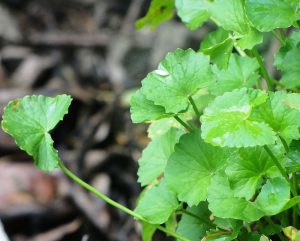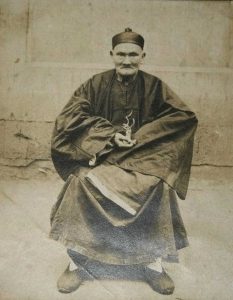Time-tested Ayurvedic herb gotu kola may rejuvenate the brain and ease anxiety.

- Reducing anxiety, possibly through interacting with the relaxation-promoting neurotransmitter GABA.
- Improving cognitive deficit. Gotu kola may ameliorate age-related cognitive decline and memory in particular.
- Uplifting mood. Some studies have shown that gotu kola may have an antidepressant, mood-boosting effect.
- Antioxidant activity. Gotu kola appears to improve the brain’s antioxidant defenses.
Overview
Gotu Kola (Centella asiatica) is a plant that has been traditionally in traditional Indian (Ayurvedic) and Chinese medicine for thousands of years. This versatile herb is said to promote longevity and has a wide variety of traditional uses including improving blood circulation, wound healing, skin and digestion-related conditions, and acting as a brain tonic.
Today, gotu kola mostly used for varicose veins and chronic venous insufficiency. However, recent animal and human research has demonstrated that gotu kola may be a potential herbal benefits including anxiolytic, antidepressant, antioxidant, and anti-inflammatory effects, in addition to improvement of memory and overall cognitive deficit. As a result of these activities, it has grown in popularity as a nootropic.
Gotu kola’s effects are believed to result primarily from compounds known as centelloids, which include madecassoside, asiaticoside, madecassic acid and asiatic acid.1

How Gotu Kola Might Help with Brain Health
Like many other nootropics, precise mechanisms through which gotu kola exerts its effects are not yet fully understood, but there are several possibilities.
Increasing neurotransmitter levels
Some studies have shown that gotu kola may bind together with the receptors for gamma-aminobutyric acid (GABA), a neurotransmitter that reduces neuron activity and produces a relaxed feeling. It has also been shown to increase GABA levels in a dose-dependent way.2 Moreover, gotu kola has been demonstrated to increase levels of the neurotransmitters serotonin, norepinephrine, and dopamine in rat brains.3
Antioxidant activity
Oxidative stress caused by reactive oxygen species (ROS) has been implicated in age-related cognitive decline and related conditions such as Alzheimer’s. Gotu kola extract supplementation appears to increase the brain levels of antioxidant compounds glutathione and catalase, helping to shield delicate neurons, and also results in a decrease of malondialdehyde (MDA), a common marker of oxidative stress.4
Promotion of neurite growth
Several studies suggest that gotu kola might enhance the growth of neurites – the branching projections of a brain cell that help with receiving and sending electrical signals. It believed to achieve this by increasing the release of brain-derived neurotrophic factor (BDNF) – a protein that promotes neuron growth and survival.5 6
Gotu Kola’s Nootropic Benefits
As a nootropic, gotu kola is reputed to improve multiple aspects of brain health and function, including memory, focus, mental energy, anxiety, and sleep. Gotu kola has a long history of use as a mind booster.
In addition, clinical investigations using both rodent and human models have provided scientific evidence for gotu kola’s effects on central nervous system. This versatile herb has been demonstrated to improve cognitive deficits, reduce anxiety and depression, and even affect mood.
Research
Animal Research
The results of clinical investigations using rodent models largely support the traditional application of gotu kola in the prevention and treatment of anxiety and age-related decline in memory and learning. Specific findings indicate that gotu kola may:
- Reduce learning and memory impairment in mice8 9
- Protect the brains of older rats against neurodegenerative disorders such as Parkinsonism10
- Reduce anxiety in mice without sedative effects11
- Enhance cognition in healthy rats12
- Have an antidepressant effect in mice13
Human Research
Only a few studies of gotu kola have been performed in humans, and the researchers stress the need for larger trials. However, the findings are promising.
Gotu kola extract appears to improve memory and mood in elderly individuals
In this randomized, double-blind trial examined gotu kola’s effectiveness in helping with aged-related cognitive decline. Twenty-eight elderly individuals were given gotu kola extract (250, 500, or 750 mg) or placebo daily for 2 months. The 750 mg dose was found to improve memory, while all doses were reported to improve mood in terms of alertness and calmness.
- The researchers concluded that “the present findings suggest the potential of Centella asiatica to attenuate the age-related decline in cognitive function and mood disorder in the healthy elderly“14
Gotu kola extract (1000 mg) may help with general anxiety disorder
This study examined the anxiety-reducing effects of gotu kola. Centella asiatica extract (1000 mg) was given daily to 33 people with general anxiety disorder for 60 days. CA extract was found to not only improve anxiety, but also related stress and depression.
- The researchers concluded that “Centella asiatica may be useful in the treatment of GAD and may be used as a promising anxiolytic agent in near future“15
Gotu Kola extract (12 g) seems to ease anxiety
This randomized, double-blind study, evaluated the anti-anxiety effects of gotu kola. Twenty healthy individuals received a single dose of gotu kola extract (12 g) or placebo and their startle response — the response to sudden threatening stimuli — measured. Compared with placebo, Gotu Kola-treated individuals demonstrated a significant reduction of the startle response.
- The researchers concluded that “Gotu Kola has anxiolytic activity in humans,” but also acknowledged the its therapeutic efficacy needs to be confirmed in larger clinical trials.16
Nootropic Dosage
- The most common dosage range in successful studies is 250-1000 mg Centella asiatica extract
- However, doses of as high as 12 g daily have been found to be both effective and safe
- Gotu kola supplements you can buy retail typically ranges from 350 mg – 500 mg, taken once or twice daily
Supplements in Review Says
- Gotu kola 350-1000 mg per day.
Gotu kola’s reputation as an all-around brain tonic seems to be solid. Although human trials are few in number, existing research evidence is overwhelmingly positive and has provided evidence for gotu kola’s antidepressant, anti-anxiety, memory-boosting, and cognitive deficit-improving effects.
Supplement recommendations and clinical research seem to suggest a dose of 350 – 1000 mg. Gotu kola supplements provide 350 – 500 mg taken once or twice daily, while clinical trials used 250 mg as the minimum dose, and report that higher doses (750-1000 mg) were more effective. Note, this isn’t really a GNC supplement unless it is buried in a stack with nootropics like ginkgo biloba, lion mane, ginseng, bacopa and others. If you’re looking for a standalone gotu kola supplement, you may have to buy online.
Leave a Reply